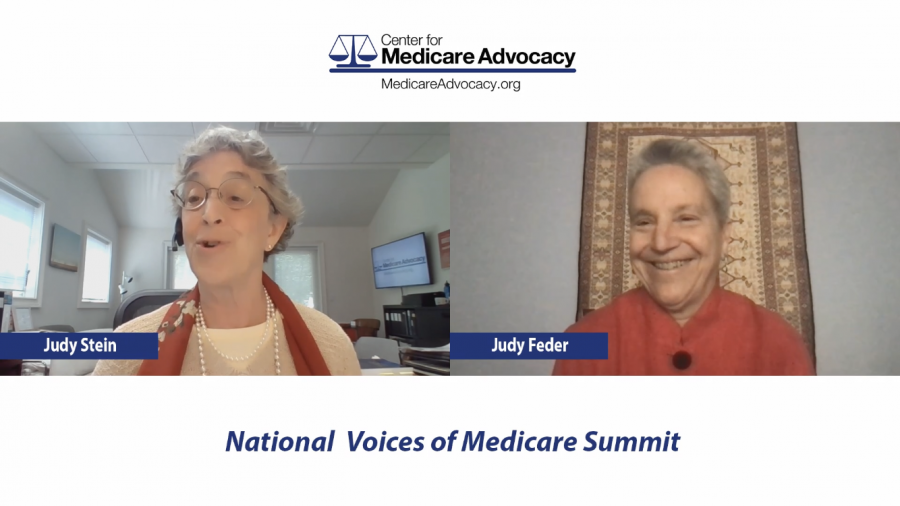
On May 18, 2022, the Center for Medicare Advocacy held its ninth annual National Voices of Medicare Summit and Senator Jay Rockefeller Lecture. Center for Medicare Advocacy Executive Director Judy Stein, and Georgetown University Professor and President of the Center for Medicare Advocacy’s Board of Directors Judy Feder opened the Summit. Feder remarked on the “great community” joining together for the Summit, which is “committed to assuring and strengthening the right to health care that Medicare provides.” Feder underscored the importance of advocacy work against threats of reducing and stripping away rights. She noted that the Center for Medicare Advocacy (the Center) works to “remind us all how the Medicare program is supposed to work, how it can work, and how it must work to live up to its promise.”
Stein welcomed the attendees, panelists, award recipients and sponsors by reiterating the original vision behind the Summit nine years ago. The purpose of the Summit is to “create a time for a multidisciplinary group of people who care about fair access to Medicare, quality healthcare and equity, to get together to exchange ideas, learn, energize one another, and to have some fun,” Stein said. The 9th annual Summit, like Summits the years before, achieved these goals, and did not disappoint!
Some Highlights From the Summit:
- Framing the Day
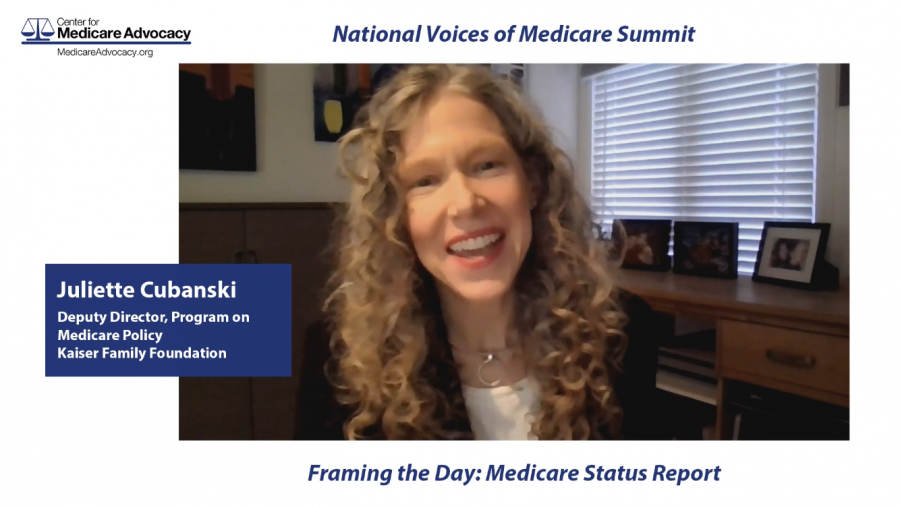
Juliette Cubanski, Deputy Director for Program on Medicare Policy at Kaiser Family Foundation, framed the day with a Medicare Status Report, highlighting the challenges and opportunities facing the Medicare program today. Her presentation included data on median income, savings and home equity for Medicare beneficiaries overall, but cautioned that those median numbers masked disparities, as Black and Hispanic Medicare beneficiaries had significantly lower resources than White beneficiaries. She noted the importance of this data because of the “implications for affordability of health care costs for these different groups.” This information was central to many of the discussions throughout the day at the Summit.
- Enhancing Medicare for All Beneficiaries
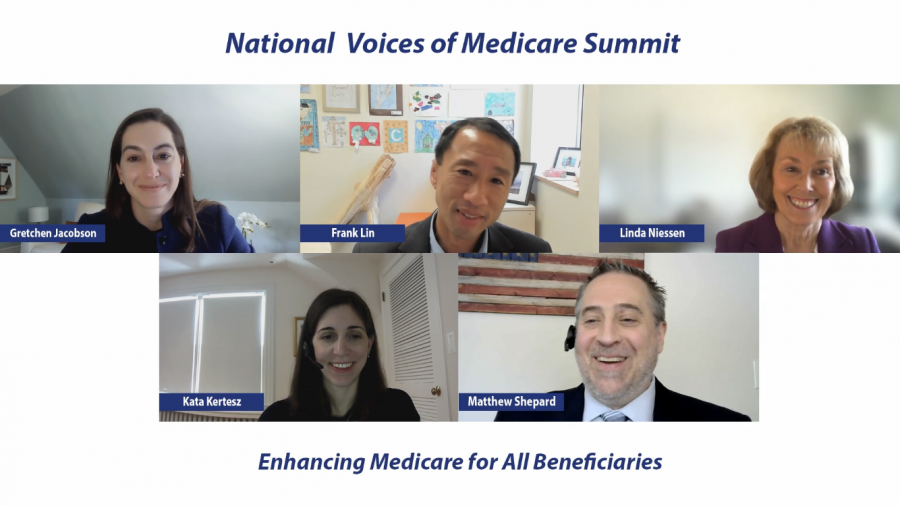
This panel, moderated by Kata Kertesz, Policy Attorney at the Center, focused on necessary enhancements and expansions to the Medicare program that would improve outcomes and quality of life for all beneficiaries. Gretchen Jacobson, Vice President of Medicare at The Commonwealth Fund, framed the panel discussion by outlining the gaps in Medicare and the desperate need among beneficiaries for these services. She pointed to research data demonstrating that because of the high costs associated with care that is not covered by Medicare, many beneficiaries forgo care that they need. The “costs of Medicare and gaps in care are felt most acutely by American Indian beneficiaries and Black beneficiaries…Medicare’s coverage is insufficient for many beneficiaries and its gaps greatly financially affect some beneficiaries,” she said. Jacobson’s remarks set the stage for the presentations highlighting the need for specific gaps in Medicare to be filled, namely hearing and audiology and oral health care.
Frank Lin, Director of the Cochlear Center for Hearing and Public Health at Johns Hopkins University and ENT surgeon, presented on the need for Medicare to cover hearing care. Lin presented that most hearing loss, age-related hearing loss, is not covered by Medicare, even though hearing care is critically important. With high out-of-pocket costs, it is not surprising that hearing aid use is very low.
Lin said that even the private Medicare Advantage plans that have hearing or audiology coverage are usually not sufficient to cover the full costs of a hearing aid; studies he cited found that beneficiaries are often left to pay about 80% of the costs of a hearing aid out-of-pocket. Hearings aids can cost as much as $4,700.
Linda Niessen, Vice Provost for Oral Health Affairs, Kansas City University presented on the need for a comprehensive oral health benefit in Part B in order to improve oral health and overall health for all beneficiaries. While noting that some private Medicare Advantage plans offer some oral health coverage, Niessen pointed out that they “have high variability,” and attributed this to the fact that there is no “standard [oral health] benefit in Part B.”
Both of the presentations by Lin and Niessen also noted the connection between their respective specialty areas to overall health and well-being of beneficiaries. The presentations cited studies that demonstrate links between hearing loss and dementia and untreated dental issues and other disease.
Lin cited, among other research, the Lancet Commission on Dementia, which found that hearing loss in mid and late life were implicated as the single largest risk factor for dementia that is potentially modifiable. He emphasized that hearing loss increases dementia risk; treating hearing loss may lower risk of dementia.
Niessen made the connection between oral health and system inflammation, stating that untreated oral health issues can affect a number of other conditions, including cardiovascular disease, colorectal cancer, respiratory tract infections and bacterial pneumonia, diabetes insulin resistance and even Alzheimer’s disease.
These studies illustrate how existing exclusions in Medicare coverage for expansive oral health and audiology coverage are arbitrary. Lin and Niessen also discussed the disappointing lack of movement on the Build Back Better legislation, which had held so much promise of making necessary expansions in Medicare.
- Voices of Medicare/ Community Experience
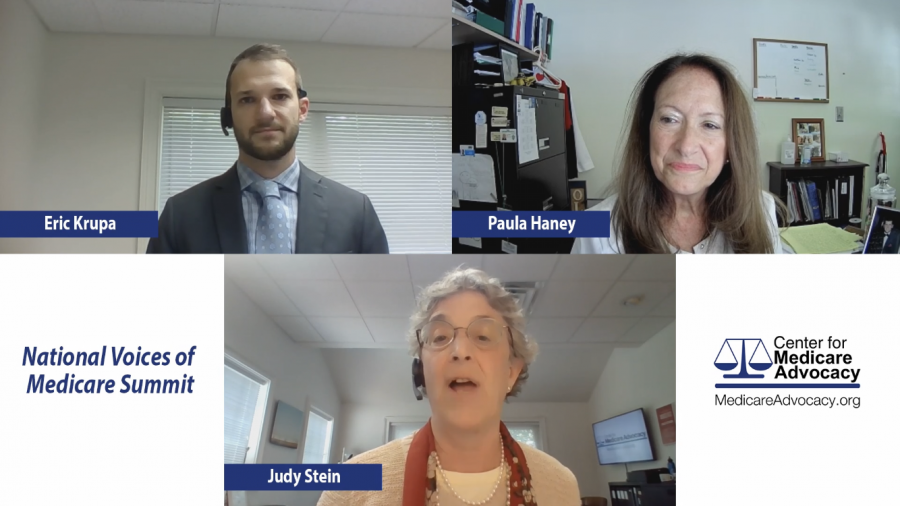
Eric Krupa, Center Attorney, and Paula Haney, Director of Rehabilitation at St. Joseph Living Center, highlighted how artificial intelligence-based decision-making is inappropriately limiting coverage for some beneficiaries enrolled in Medicare Advantage plans. They shared the story of a beneficiary whose Medicare skilled nursing facility coverage was being managed by naviHealth, a company acquired by UnitedHealthcare that makes Medicare determinations based on proprietary electronic tools. naviHealth attempted to terminate her Medicare coverage on almost a weekly basis for nearly four months, despite the facility’s insistence that her rehabilitation regimen continued to be necessary. Haney explained that naviHealth was failing to take into consideration the beneficiary’s unique circumstances and instead seemed to be relying on their AI decision-making tool.
Haney explained these situations are becoming more common—with naviHealth increasingly becoming involved in her patients’ care and issuing denials to terminate coverage. Haney noted the detrimental impact that denials of coverage and calls from naviHealth made to beneficiaries regarding discharges have on beneficiary well-being and outcomes. “Many times, they [beneficiaries] will decline their therapy the day following these calls because they are so upset,” Haney said.
- Conversation with Medicare Directors: A Vision for Medicare to Meet All Beneficiaries’ Needs
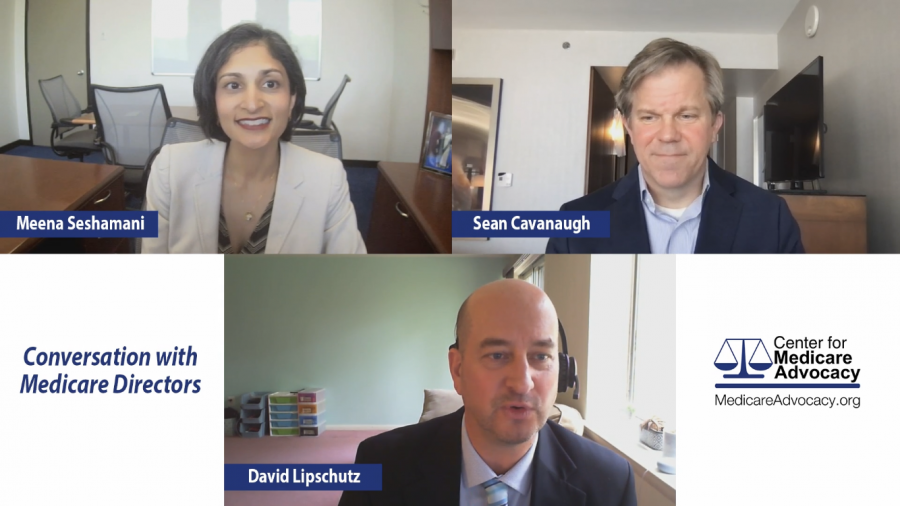
In this panel, led by Center Associate Director David Lipschutz, current Director, Center for Medicare, Centers for Medicare & Medicaid Services Meena Seshamani, and former Director Sean Cavanaugh discussed their experiences, recommendations, challenges and goals for the Medicare program.
Seshamani emphasized the importance of engaging with the communities served by the Medicare program, noting that with 64 million beneficiaries, there are diverse needs that must be considered. Citing the “strategic pillar of CMS to really engage the communities that we serve with our programs and to really have external engagement be front and center for our policy making process and for our operations,” Seshamani said a critical goal for her is to “hear from voices that have not always been heard.”
When asked about reform opportunities to rein in Medicare Advantage overpayments, Cavanaugh cited risk adjustment as an area that should be addressed. “We’ve literally created a nonproductive industry, where there are businesses that collect diagnoses on Medicare Advantage solely for the purpose of getting paid — not to improve the care that these folks receive, but to improve the payment that the plans receive,” he said.
“Now, risk adjustment is absolutely necessary, and using diagnoses makes sense. But this is an unintended consequence, where there’s no benefit to society and there’s enormous sums of money being spent on this. So that’s something that’s troubled me for a while,” he added.
Seshamani said that CMS is “looking at risk adjustment, coding patterns, etc., and that is also ongoing work that we are exploring,”
- Voices of Medicare/ Community Experience
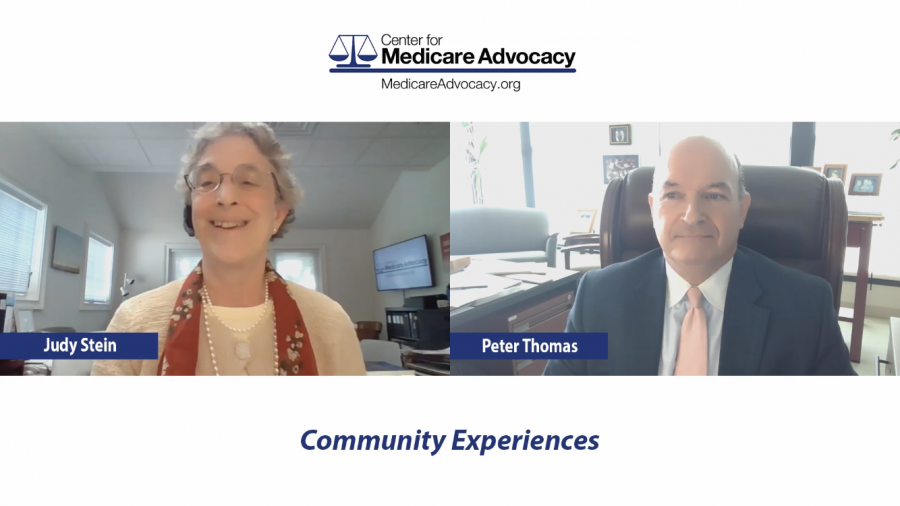
Peter Thomas, Managing Partner at Powers Law, spoke of his own personal experience with rehabilitation services and care after a “life-changing” childhood accident. He detailed how the experience made him value the importance of rehabilitation and good quality care and shaped his career path trying to “enable others to get the same kind of access.”
Thomas went on to outline instances in which “Medicare doesn’t seem to meet its promise” to beneficiaries, such as prior authorizations in MA aimed at controlling utilization, lack of dental, vision and hearing care, use of contractors to question medical decisions of physicians, and other barriers to necessary care.
- Senator Jay Rockefeller Lecturer – E.J. Dionne, Jr
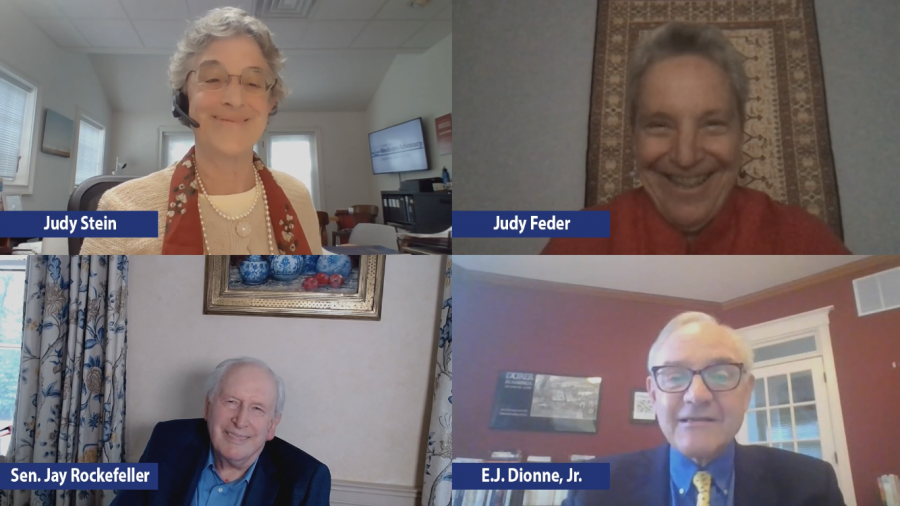
The Center for Medicare Advocacy was honored to recognize E.J. Dionne, Jr. as the 2022 Sen. Jay Rockefeller Lecturer, in recognition of his important contribution to journalism, honest political analysis, and civil discourse as a writer, commentator, professor, and thought leader who has added to the country’s knowledge and understanding of issues that affect us all.
Dionne is a Senior Fellow at the Brookings Institution, a syndicated columnist for the Washington Post and professor at Georgetown University. His lecture focused on the importance of defending social insurance against attacks and cuts to essential programs. He said “preserving the [Medicare] program’s support for the least advantaged and the sickest among the elderly, and those who face the greatest health challenges, should always be front and center in the national discussion.”
In remarks that Stein called “beautiful and deeply soulful,” Dionne called on the audience to “never lose track” of the objectives Lyndon B. Johnson lifted up when he signed Medicare into law in 1965. Quoting Johnson, Dionne said “care for the sick and serenity for the fearful,” captures the purpose of the health care system on which older adults, people with disabilities and their families rely.
Dionne emphasized how critical the concept of social insurance is to the proper workings of society:
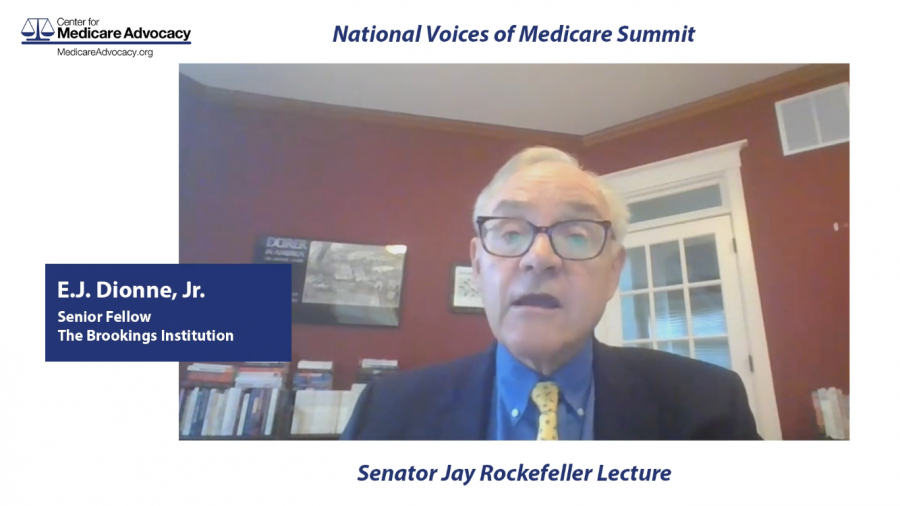
Social insurance reflects an awareness that a wealthy market economy can go off the rails and leave individuals and groups behind. Even the most successful can fall on hard times. Social insurance reflects a commitment we make to each other that when I’m down those doing well will help lift me back up, and when I’m up I will help to lift those who are down. We do these things through government because in many areas… especially health care, government is the only institution with the resources to get the job done.
Dionne also urged those in attendance to not only “defend the social achievements of earlier generations,” but also “extend” them to generations to come.
- Alfred J. Chiplin Social Justice & Advocacy Award – Wey-Wey Kwok
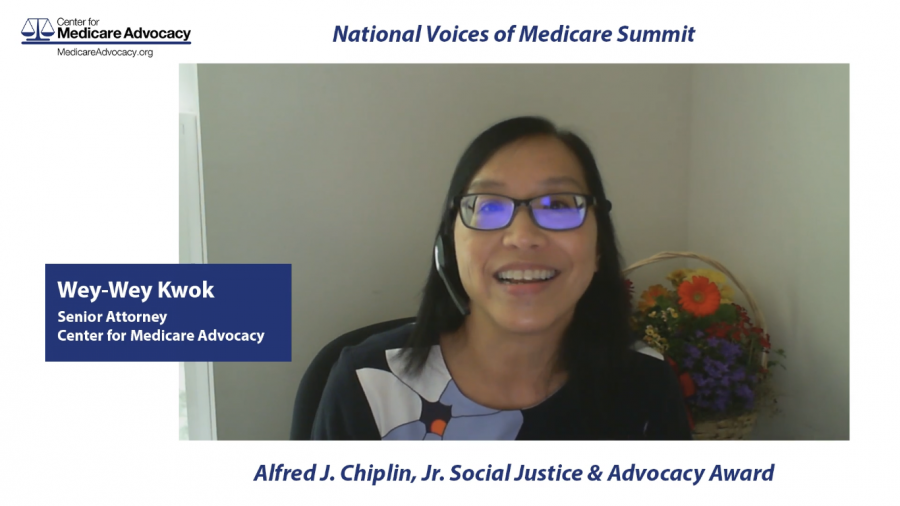
For decades, our Center colleague, Alfred J. Chiplin, Jr. (Chip) was a beloved and admired leader in the elder law, disability and health care rights communities. To honor Chip’s superb advocacy and commitment to civility and justice for all members of society, the Center for Medicare Advocacy established an award in his honor in 2017. The Alfred J. Chiplin, Jr., Social Justice & Advocacy Award, is given annually to an individual who works to advance civility in society and social justice for all – as Chip did for decades.
The Center for Medicare Advocacy was honored to name Center Senior Attorney Wey-Wey Kwok as the 2022 Chiplin awardee, in recognition of her decades of dedication and commitment to improving access to comprehensive Medicare, health equity, and quality health care through her legal expertise, advocacy, and compassion.
In opening remarks read by Stein, Ben Belton, the inaugural Alfred J. Chiplin, Jr., Social Justice & Advocacy Awardee, said “Chip [Alfred J. Chiplin] found greatness in a life given to service and his legacy, being as great as the man himself, is one of service. Chip’s work continues through the hands and hearts of people like Wey-Wey.”
Kwok spoke movingly of how her first meeting with Chiplin framed her own perspective on advocacy work, saying that a “powerful sense of community embraced the room” during Chiplin’s Medicare training session she attended many years ago.
Kwok powerfully cited Chiplin’s awareness that a “whole community” is necessary to exact change, as a driving force in her own representation of beneficiaries. “It fills me with joy, hope and inspiration to think of all the advocates and health care champions across the states who are making a difference through direct service, coalition building, policy and research, philanthropy, as well as courageous reporting to address what is happening to health care for the people of our country,” she said.
In citing concerning trends in Medicare of denials and disparities in care, Kwok noted the Center’s tireless work to “defend the promise of Medicare and to protect and improve this vital institution for current and future beneficiaries,” in response to these barriers to care.
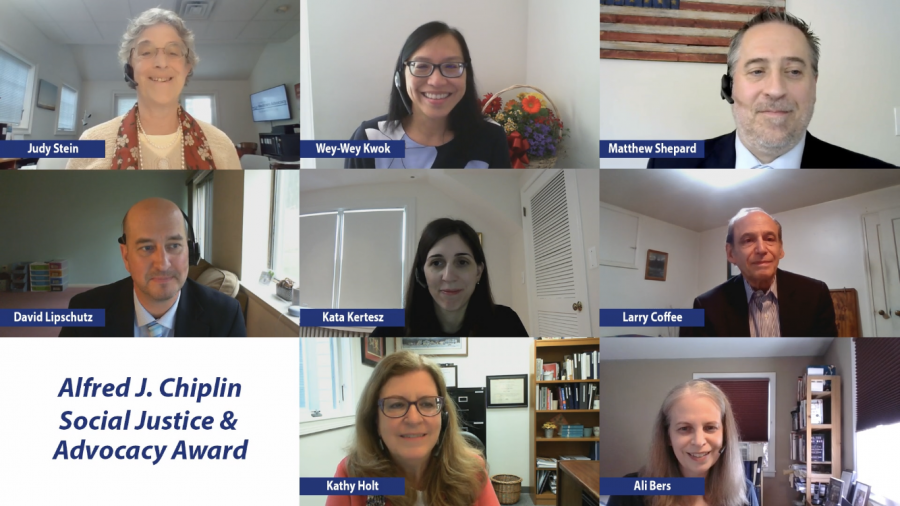
The award presentation concluded with a surprise for Kwok, as Center colleagues, including Associate Director, Kathy Holt, and Litigation Director, Ali Bers, and long-time colleague and friend of the Center, dentist Larry Coffee, joined in applause and congratulations to Kwok for her determined advocacy on behalf of beneficiaries and her award.
Congratulations to Center Senior Policy Attorney, Wey-Wey Kwok!
- Closing Remarks
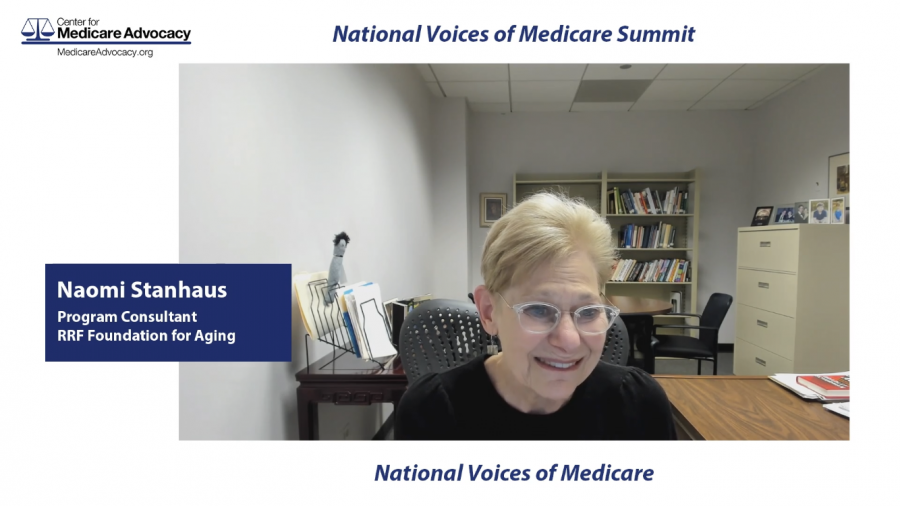
Summit attendees also heard from Naomi Stanhaus, Program Consultant, RRF Foundation for Aging, who cited RRF’s “staunch” support for the Center for Medicare Advocacy and the Center’s work in preserving Medicare for future generations while working to expand coverage and improve health equity. In encouraging foundations to provide core support for long-standing advocacy, Stanhaus said “we know that achieving affordable health care and health equity for economic justice does not come easily and takes long-term support.”
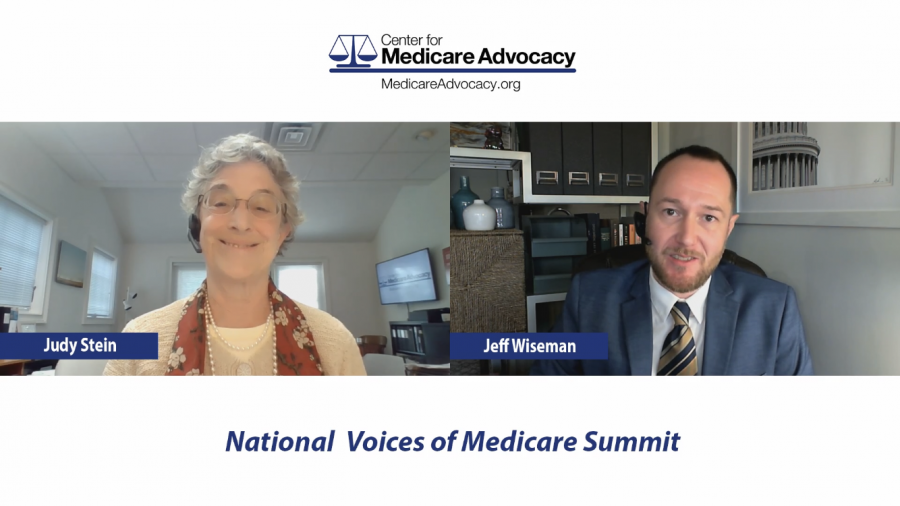
Closing remarks were from Stein and Jeff Wiseman, Center for Medicare Advocacy Development Manager, thanking attendees, presenters and sponsors. Wiseman noted that over 625 people registered for the event from all 50 states and most of the territories, making the Summit “truly a national event.”
Summit registrants also received early access to a Center for Medicare Advocacy special report, authored by Chiplin Medicare and Health Policy Fellow Cinnamon St. John. The report, Telehealth and the Medicare Population:Building a Foundation for the Virtual Health Care Revolution examines the evolution of telehealth for the Medicare population. While grounded in research, the report was guided by interviews with experts from around the nation about the complexities (both challenges and conveniences) that older adults and people with disabilities face accessing virtual care.
- Gratitude For Our Community
The Center for Medicare Advocacy thanks all of our attendees, presenters, and especially our generous sponsors – Inclusivity Sponsor: Arnold Ventures; Senator Jay Rockefeller Lecture Sponsor: The John A. Hartford Foundation; Panel Sponsors: AARP, Alzheimer’s Impact Movement, Santa Fe Group, SEIU; Community Sponsors: The Christopher & Dana Reeve Foundation, Powers Law; Program Sponsors: C-TAC, Medicare Rights Center, The Michael J. Fox Foundation, Rothkoff Law Group; Friends of the Summit: Families USA, The Gerontological Society of America, Justice in Aging, Mansfield Family Practice, The Group of Oppenheimer & Company, Sturgul & Long.
Your participation makes the National Voices of Medicare Summit & Sen. Jay Rockefeller Lecture possible and successful.
We look forward to working together to advance access to quality health care for all – and to further exploration together next year!
